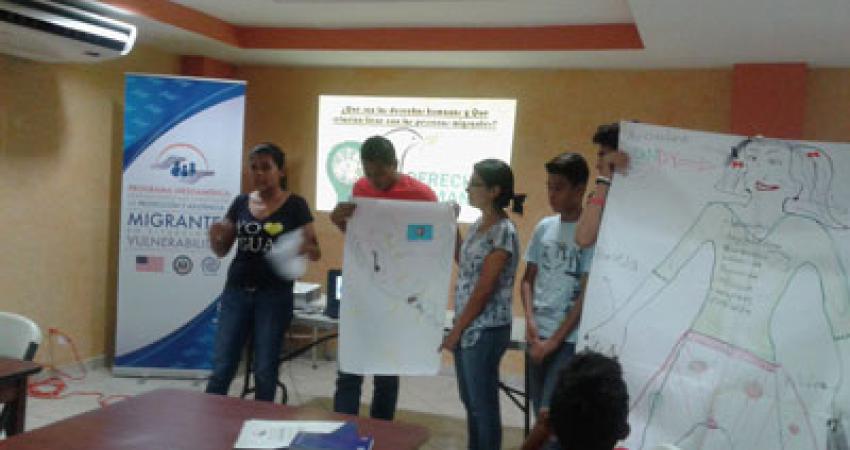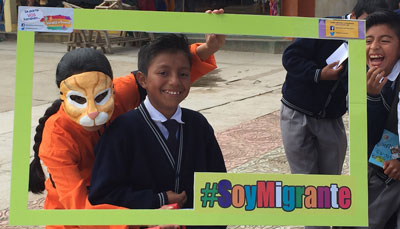Mesoamerica Program Begins Phase Seven

Costa Rica. Last October the International Organization for Migration (IOM) launched a new phase of its Mesoamerica Regional Program, in which human and technical resources will be devoted to building the capacities of governments and civil society for managing safe, orderly, and regular migration, with an emphasis on respecting the human rights of migrants most at risk for irregular migration.
 This Program is being implemented in ten regions around the world, based on five key pillars: capacity building; prevention through awareness-raising activities; direct assistance; promotion of regional, bilateral, and local coordination efforts; and migration management in crisis situations. In the case of Mesoamerica, the Program has been adapted to the characteristics of the region, considered to be one of the world’s most important migratory corridors, with people migrating internally, movements between Central American countries, transit of extra-regional migrants and, to a greater extent, movements towards and returning from North America.
This Program is being implemented in ten regions around the world, based on five key pillars: capacity building; prevention through awareness-raising activities; direct assistance; promotion of regional, bilateral, and local coordination efforts; and migration management in crisis situations. In the case of Mesoamerica, the Program has been adapted to the characteristics of the region, considered to be one of the world’s most important migratory corridors, with people migrating internally, movements between Central American countries, transit of extra-regional migrants and, to a greater extent, movements towards and returning from North America.
Among the most vulnerable and highest priority migrants are children. In 2014, more than 68,000 unaccompanied children from Central America arrived at the U.S.-Mexico border. So far during 2016, the total has exceeded 59,000. The dynamics of human mobility in this region are caused by a complex mix of political, economic, and social factors. Taking the example of El Salvador, of the 43,053 migrants who returned to the country between January and October 2016, 75% of the adults decided to migrate for economic reasons, and 16% for issues related to insecurity. In the case of migrant children, 35% mentioned economic factors, while 34% wanted to reunite with their family.
"The vulnerability of migrants requires policies and actions in the countries of origin, transit, and destination, from a perspective of shared responsibility, which has been promoted by the eleven countries that comprise the Regional Conference on Migration. For this new phase, the Program specifically seeks to build the capacities of governments and civil society to manage international migration in a comprehensive manner, promoting the human rights of migrants and responding to their needs, both at the central and local levels. Issues such as migration and youth, migrant children, trafficking in persons, and protection during crisis situations will be part of the Program's priorities for the remainder of 2016 and 2017," explained Alexandra Bonnie, Program Regional Coordinator.
In its seventh phase, the Mesoamerica Program expects to reach an approximate population of 5,190 beneficiaries, including approximately 150 migrants in vulnerable conditions, who will be provided with direct migration services and/or voluntary return.
In its previous phases, the Mesoamerica Program has succeeded in building the capacities of officials related to migration issues, including the training of more than 300 officials through a Specialized Course on Migrant Children. In addition, eight information windows were created for migrants at high-risk border crossing points. Support was provided for the development of manuals to strengthen protection efforts, such as the Regional Action Guidelines for the Comprehensive Protection of Children and Adolescents within the Context of Migration. The program has also promoted a broad process of reflection and awareness on the issue of migration through the community-based Information on Movement campaign, which promotes respect for human rights, prevention of risks associated with irregular migration, and protection mechanisms for safe, orderly, and regular migration.
The Mesoamerica Program is funded by the United States Department of State through the Bureau of Population, Refugees and Migration (PRM), and is implemented in Mexico, Guatemala, Honduras, El Salvador, Nicaragua, Costa Rica, and Panama.
For more information, please contact Alexandra Bonnie at IOM Costa Rica. Tel: (506) 2212-5321; Email: abonnie@iom.int
